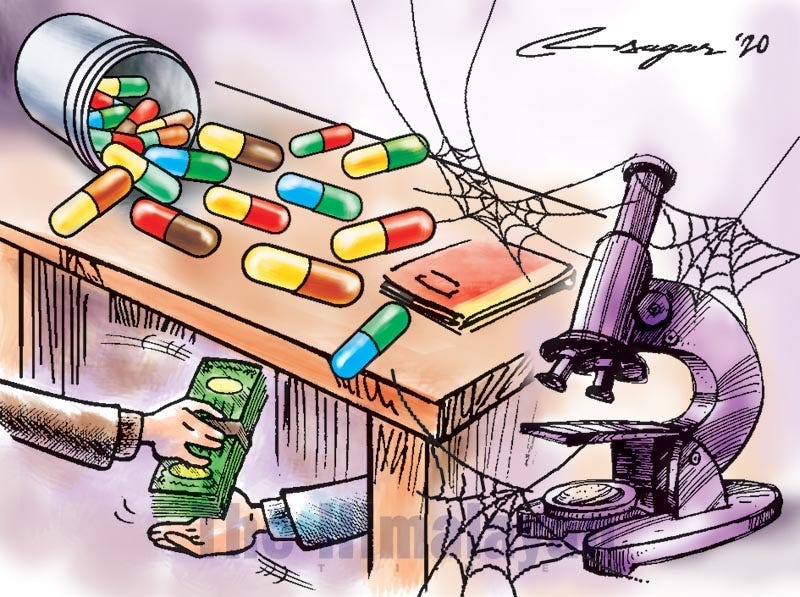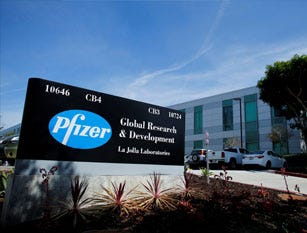Once upon a time, the authorities responsible for public health were reliable sources of guidance and offered the highest quality products and care. Medical professionals, companies, journals and nutritionists held significant stature in society, due to extensive knowledge or their reputation as trusted authorities on matters of well-being and health.
But once upon a time is no more. Studies, inquiries, and publications have exposed many instances of corruption, conflicts of interest, cronyism, corporate interests, and the commercialization of healthcare. The evidence indicates that the healthcare system is largely driven by financial gain rather than a commitment to patient well-being.
The influence of profit-driven incentives makes it difficult to see success on any level. This is evident when looking at the concerning statistics related to approved medications, medical treatments, and surgeries that often lead to negative outcomes. The ineffectiveness of these interventions is reflected in the rising rates of autoimmune diseases, obesity, heart attacks, cancer, diabetes, mental health disorders, and addictions.
All this raises concerns about anyone being able to completely put their trust into this system. Let's explore a few examples to find out.
Doctors
The foundation of the doctor-patient relationship is based on trust, communication, and respect, all aimed at delivering top-notch, patient-focused care. However, this ideal can be compromised when doctors engage in unethical practices such as accepting kickbacks or bribes from pharmaceutical companies, medical device manufacturers, or other industry stakeholders in return for endorsing or prescribing their products.
Doctors also frequently serve as consultants or advisors for pharmaceutical enterprises, offering insights on drug development, research, marketing strategies, or other relevant activities in exchange for financial compensation, another conflict of interest.
And within healthcare institutions, physicians may encounter pressure to meet specific targets or quotas, potentially motivating them to prioritize financial interests above patient well-being. As a result, instances of overdiagnosis, overtreatment, or unnecessary procedures may occur.
Although not all doctors practice unethically, examples such as these showcase substandard care and corruption that contributes to deteriorating health outcomes.
Hospitals

“What allows hospitals and doctors to care for people 24/7, whether it’s a harmless rash or a life-threatening emergency, is also what makes healthcare systems vulnerable to corruption. They have large workforces and diverse stakeholders, millions to billions of dollars in funding, and huge procurement systems that make them ready to help us when we need it. But with so much money at stake and so many moving parts, they are also attractive targets for criminals.”
For example, hospital officials may accept bribes or engage in collusion with suppliers, resulting in the purchase of overpriced or substandard medical equipment, supplies, or drugs. These same people have also been shown to embezzle or misappropriate public funds intended for healthcare services, diverting crucial resources away from patient needs and towards personal enrichment.
Cronyism and nepotism may also be present with appointments of staff, awarding of contracts, or referrals influenced by personal connections or favoritism rather than merit. It’s a series of unethical behavior that leads to healthcare professionals receiving kickbacks or having financial ties with pharmaceutical companies or medical device manufacturers. Such greed diverts crucial resources, undermines the integrity of the system, and ultimately leads to poor quality of care and worsening health outcomes for patients.
Pharmaceutical Companies
On paper, pharmaceutical companies play a crucial role in advancing public health by developing and providing safe and effective medications to treat and prevent various diseases and medical conditions. Reality is shockingly different.
Many pharmaceutical companies manipulate or selectively publish research studies that support the efficacy of their products while suppressing those that show adverse events, limited benefits or drug side effects. They may also ghost-manage" medical research, where industry representatives draft and publish studies in the names of doctors/researchers to make industry-sponsored work appear independent.
Sometimes these entities engage in off-label marketing, promoting their drugs for uses unapproved by regulatory agencies, while others engage in collusion or price-fixing schemes with competitors to artificially inflate drug prices, limit competition, and maximize profits.
Many of these companies are industry heavyweights that exert influence over regulatory bodies like the FDA through lobbying, revolving doors between industry and funding. These illegal shenanigans lead to ineffective treatment, overpricing, limiting access medicines and even harm to health.
Nutritional Science
Nutritional science, like any other field of research, can be susceptible to corruption and bias that can undermine the integrity and reliability of research findings. For example, the food industry, including food manufacturers, agricultural companies, and pharmaceutical companies, often have a vested interest in promoting or protecting their products.
Studies in the field of nutritional science are frequently financed by industry sponsors, government agencies, or non-profit groups. These sources of funding have the potential to impact the research agenda, study design, data interpretation, and publication results, often leading to findings that align with the interests of the sponsor.
Publications and researchers also have a tendency to highlight positive results while overlooking or withholding negative outcomes. This bias in publication can skew the overall evidence on nutrition and result in inaccurate conclusions.
Financial ties, consulting agreements, or other relationships with food companies, supplement manufacturers, or the pharmaceutical industry are also a big problem that follows researchers, academics, and other experts. These conflicts of interest can compromise objectivity, credibility, and independence of scientific research.
Overall, corruption in nutritional science has the potential to erode trust in the field, undermine public health efforts, and contribute to the continual erosion of public health.
Dietitian Society
The Academy of Nutrition and Dietetics (AND), the largest organization of nutrition professionals in the US is supposed to promote nutrition and the health of people through education, advocacy and research. It also has become hopelessly corrupted through financial ties to the processed food industry, receiving millions of dollars in funding from Nestlé, PepsiCo, Hershey, Kellogg's, and others linked to products high in sugar, fat, and ultra-processed ingredients.
Internal emails show the AND engaged in sponsorship deals functioning as quid pro quo, where companies paid fees in exchange for specific rights and benefits, such as having dietitians promote their products.
Key leadership and staff at AND have also held positions or worked as consultants for major food corporations like Monsanto, the Sugar Association, and industry front groups, creating a glaring potential conflict of interest. Additionally, documents revealed that AND held investments and stock in ultra-processed food companies, raising serious questions about its ability to provide impartial, or even healthy nutrition guidance.
Between these conflicts of interest and questionable investments, a revolving door has developed between AND and the food industry, with current and former industry public relations staff and consultants serving on AND's board and staff. This suggests that corporate funding and influence have become normalized within AND, advancing the interests of its corporate sponsors above patients.
The academy and its foundation represent more than 112,000 credentialed practitioners, with many working within healthcare settings such as hospitals, clinics, nursing homes, and other medical facilities. Even individually, some have become deeply entangled with and influenced by the very food companies that produce unhealthy, ultra-processed products linked to diet-related diseases. This raises serious doubts about the organization's ability to provide truly independent, evidence-based nutrition guidance in the public interest.
What I’ve shown you today proves that the U.S. health care system is cruel, dysfunctional and deeply corrupt. The very groups that should be tackling and reducing ill health and diseases are in fact in bed with companies that are making everyone increasingly sick. In each case, it’s important for consumers to carefully evaluate where they seek out health guidance and evaluate whether it is in their best interest before making important decisions.
Your presence here is greatly valued. All our resources are available without cost, so please make use of our full, free library. But if you found the content interesting and useful, please consider supporting it through a paid subscription. It helps in covering some of the operational costs and supports the continuation of this independent, unbiased research and journalism work.









